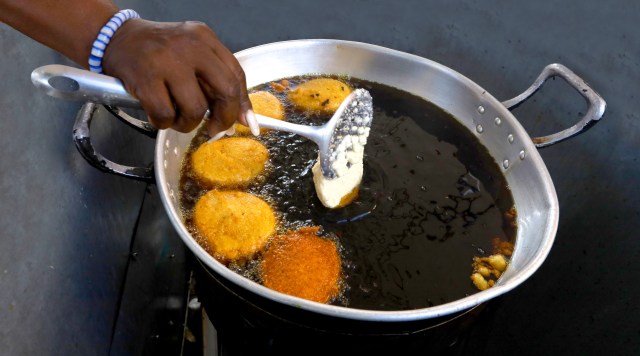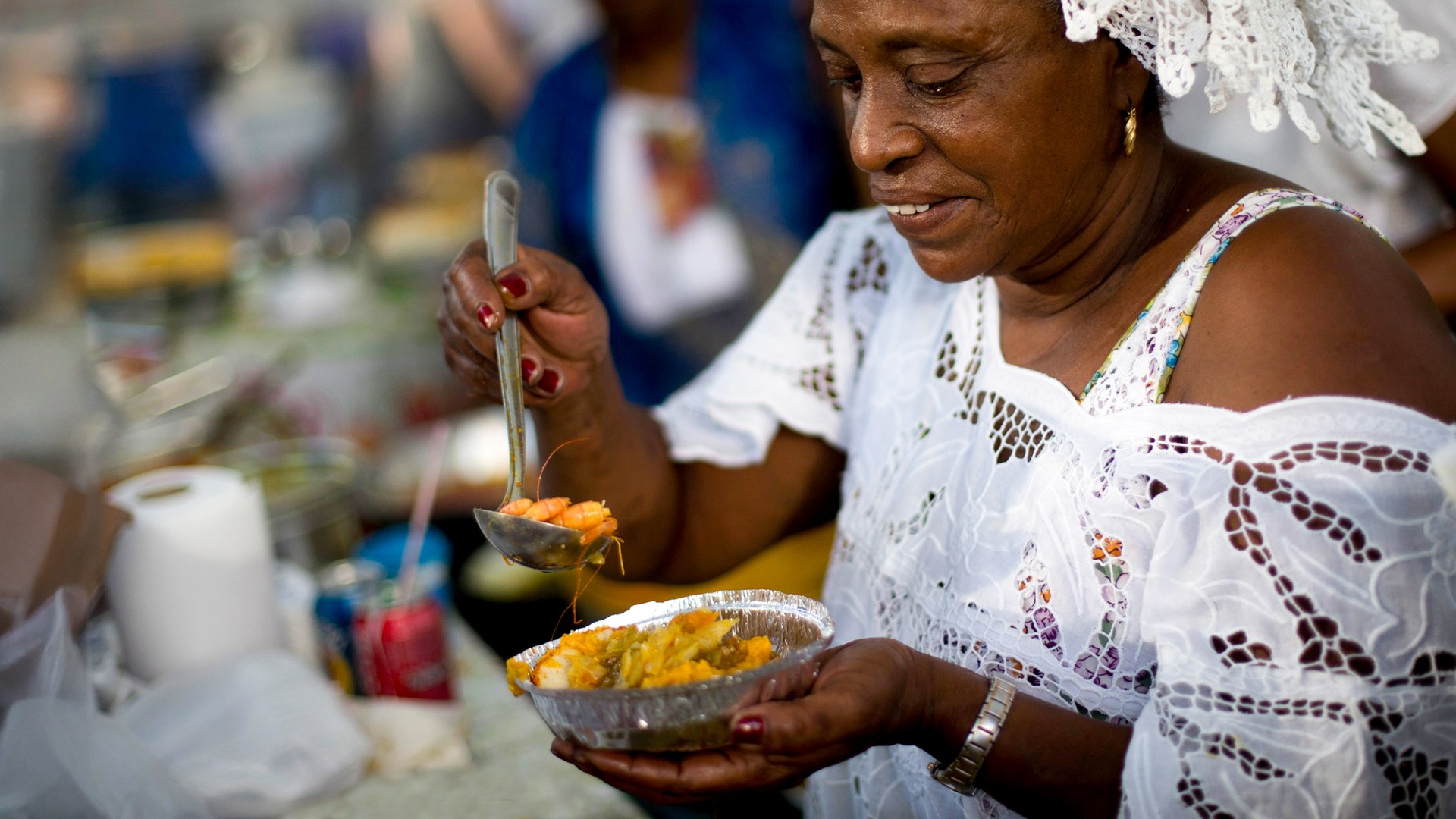It’s summer in the Southern Hemisphere, and many tourists have arrived in northeastern Brazil, eager to wander the cobblestone streets of Salvador, the vibrant capital of the state of Bahia, renowned for its Afro-Brazilian culture. Many will grab a bite at one of plentiful colorful stalls selling local culinary specialties like acarajé.
Or maybe, if you will, a “Jesus fritter.”
A black-eyed-pea snack seasoned with onions and deep-fried in palm oil, in recent years the specialty has become a source of tension between two increasingly outspoken and growing communities: evangelical Christians and Afro-Brazilian religion practitioners and their defenders. Long a source of pride for a marginalized community, the dish’s preparation and sales are regulated by the state. Evangelicals’ discomfort over its use in traditional spiritual practices has clashed with those who see these concerns as disrespectful and racist.
“It is not just a delicacy,” said Luiz Nascimento, academic director at the Seminário Teológico Batista do Nordeste (Northeast Baptist Theological Seminary) at Feira de Santana. “Acarajé has a history related to religious practice that gives it another dimension.”
Acarajé arrived in Brazil via the Brazilian slave trade, which began in 1540 and lasted for more than three centuries. Brazil only abolished slavery in 1888, the final country in the Americas to do so, and for years the industry was a pillar of the nation’s economy.
Enslaved Africans brought a dish across the Atlantic called acara jé or “fireball to eat” in Yoruba, likely a reference to the snack’s reddish color. Many also continued to worship their local deities, known as orisha, which later syncretized with Catholic saints and developed into a handful of religious communities in parts of Brazil, Cuba, and Haiti.
Practitioners of Candomblé, the largest of these groups, frequently use food to connect with orisha, said Patrício Carneiro Araújo, an anthropologist at the Universidade da Integração Internacional da Lusofonia Afro-Brasileira, and certain foods are linked to specific entities and offered to them. Acarajé is primarily associated with Yansã, a warrior orisha and patroness of winds and fire, who is married to Xangô, the orisha of justice.
Though acarajé had a sacred significance, enslaved Brazilians also sold it during the few hours of the day they could work for themselves, and the profits frequently funded the freedom of enslaved individuals or their family members. Later, terreiros, the houses of worship for Afro-Brazilian religions, began to fund their religious work by selling acarajé.
Today, at least 3,500 people work in the acarajé industry in Salvador, smashing black-eyed peas and frying up the batter according to recipes passed down for generations. Aracajé manufacturers hand off their work to baianas do acarajé, female sellers who must follow state mandates that regulate the type of food they can sell with the acarajé and the attire they can wear. Their uniform includes necklaces known as guias, with beads made from seeds or crystals and with a color that connects to the orisha the baiana worships.
The direct relationship between acarajé and Afro-Brazilian religions has shifted as the religious and demographic landscape in Brazil transformed in the last 50 years, despite the Northeast consistently having the smallest evangelical population of Brazil’s five regions.
 Edits by CT / Source Image: Manu Dias, GOVBA, Flickr
Edits by CT / Source Image: Manu Dias, GOVBA, FlickrIn 1970, evangelicals made up 3 percent of the area’s population. By 2000, they accounted for 10 percent, and by 2010, 16 percent. (The most recent census, conducted in 2022, will publish its findings later this year.)
Many Brazilian evangelicals are Black, composing a community that has continued to suffer prejudice and racism more than a century after the abolishment of slavery. Poorer than the average Brazilian, many embraced Pentecostal teachings in the latter half of the 20th century, where they found solace and hope amid challenging circumstances. According to the 2010 census, there are 14 million Black evangelicals in the country, compared to the 300,000 Black Brazilians who follow Afro-Brazilian religions.
“If you visit Salvador today and want to eat acarajé,” Araújo said, “there’s a high chance it was prepared by an evangelical man or woman.”
When some baianas do acarajé (nearly all of whom are Black women) converted to evangelicalism, many felt uneasy selling a product tied to orisha worship. In the early 2010s, some sellers even attempted to rename the dish the bolinho de Jesus, or the “Jesus fritter.” Some pastors preached against acarajé on social media, calling it sinful.
Afroreligious scholars saw the situation differently.
Denying the religious character of the dish or trying to “convert” it is a form of racism, said anthropologist and babalorixá (Candomblé priest) Pai Rodney de Oxóssi. “Slavery ended, but things didn’t change for Black people in Brazil for a long time,” Araújo said. “Racism survives in daily actitudes, and even in religion and food.”
Nascimento observed a disparity in who is being criticized.
“If you visit a Chinese or Japanese restaurant, you’re unlikely to worry about the owner’s religion or what goes on in the kitchen,” he said. “Why, then, does this concern arise with African-origin food?”
“There’s religious intolerance toward terreiro foods,” wrote Aline Chermoula, a scholar of African ancestral cuisine.
In response to the attitudes of some Christians towards acarajé, local legislators in some Bahia cities have created strict rules about how to cook and sell traditional products, effectively banning rebranded acarajé. Currently, Bahia state officially recognizes the dish’s cultural heritage, and Brazil similarly honors the baianas’ attire at the national level, a stipulation that prevents people from making custom changes, like swapping out a white dress for a red one.
As a teenager, Luiz Henrique Caracas, who pastors an Assembly of God church in Ilhéus, a city in southern Bahia, heard a pastor using 1 Corinthians 10:21 as a rationale to avoid acarajé: “You cannot drink the cup of the Lord and the cup of demons too.” According to Caracas, the pastor was looking for a place to eat after returning from a trip, and the only spot he found was an acarajé stand. The pastor then prayed out loud in front of the vendor, rebuking the demons and consecrating the food to Jesus before eating it.
The story astonished Caracas, who grew up eating acarajé prepared by his father. To his many patrons, José Luiz dos Santos Silva was known as Irmão Luiz do Abará (abará is made with the same ingredients as acarajé, but steamed instead of fried).
Irmão Luiz do Abará grew up in a Catholic family sympathetic to Afro-Brazilian traditions before he embraced evangelical Christianity in the late 1980s. Now in fragile health, he rarely sells his products today. But for years, his church invited him to prepare acarajé and abará at its events.
The dish was so familiar to Caracas, the son, that he would never have imagined that some brothers and sisters of faith had restrictions on it. “For me, eating acarajé has always been as natural as eating any other dish,” said Caracas, who directs the Eclésia Pentecostal Theology School in Ilhéus and counts an acarajé vendor as one of his students.
Few news-making confrontations have occurred in recent years, though Candomblé practitioners continue to be bothered by evangelicals in the acarajé industry, many of whom proudly broadcast their identity by naming their stalls “El Shaddai” or “Acarajé Gospel.”
For Nascimento, all dilemmas he faces today about eating acarajé or supporting a particular vendor come down to health. His cholesterol levels have led to dietary restrictions that exclude fried foods such as acarajé.
When he could, Nasciment ate it frequently, thanking God for it every time. He quoted 1 Corinthians 10:30: “If I take part in the meal with thankfulness, why am I denounced because of something I thank God for?”











